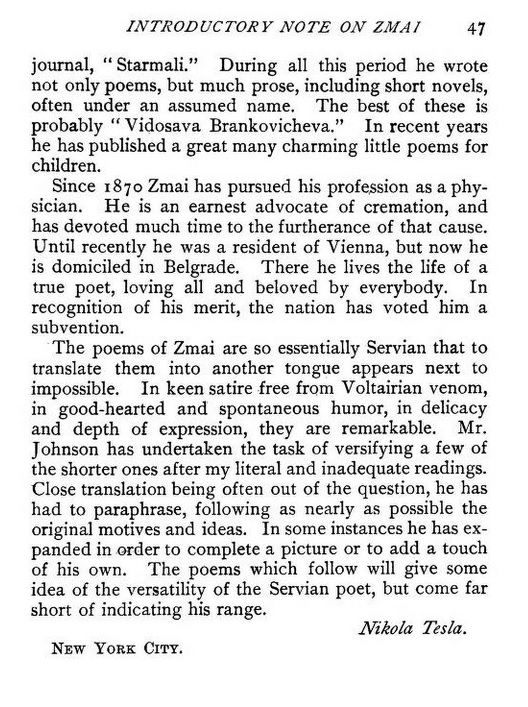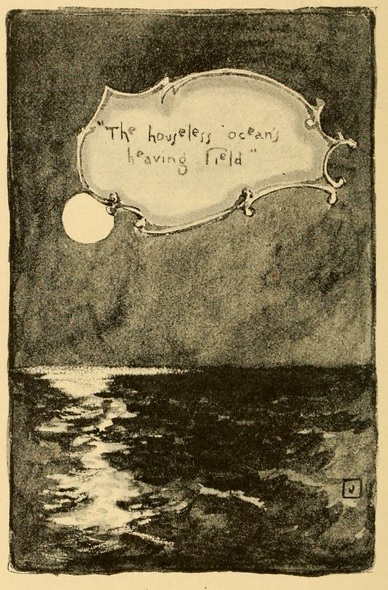TECHNICAL NOTE: The great majority of the links below are to
scanned antique books at the Internet Archive, most of them
anthologies. Poems frequently run for several pages; when coming
to the apparent end of a poem, turn the page to make sure!
-
Tabb, Fr. John Bannister:
The brain is more astonishing than the sky.
Bicycles! Tricycles!
A pun.
The Biologist
... thinks about death.
Evolution
"Out of the dusk a shadow ..."
An Objector
A version of the Nineteenth Century's most-repeated evolution joke.
A Phonograph
A mocking-bird is a natural phonograph.
A Problem in Mathematics
Either a shallow joke or extremely profound. [Unfortunately the only
online copy has typographical errors, even in the author's name.]
Science
is Martha to Faith's Mary.
Visible Sound
Like many Nineteenth Century people, Tabb evidently believed
science had proven "that form is but visible tone."
Taylor, Bayard:
-
All or Nothing
Parody of Romantic cosmology and the grandeur of geologic time.
Taylor, Benjamin Franklin:
The son of a mathematician.
Meaning the Comet of 1858.
The Northern Lights
Taylor, Bert Leston:
Surreal humourist who wrote for the Chicago Tribune.
In light of the universe's immensity, what is
less significant than a newspaper column? People who write in to
complain about it.
The Astronomer ... is puzzled by the return of Encke's comet.
Ballad of the Clark Street Cable meaning the kind of cable that pulls
a streetcar.
A Ballade of Star Dust:
"Star dust our end, from dust we came: // The stuff
of Cosmos is the same."
Blake Comes Back
"Little Ford, who made thee?"
Canopus Interstellar distances put political conventions in perspective.
The Day of the Comet, and the Morning After
The Dinosaur: The famous ditty about the supposed
posterior brain of Brachiosaurus.
Farewell!
... to the comet.
The Great Obsession
... with cleanliness. "Let the sleeping microbe lie!"
The Old Roller Towel: An example of technological change which rarely
comes to mind.
The Soil of Kansas Parodies the florid writing of an
agricultural article
by setting it as verse.
In Statu Quo
Since unfortunately there are no comets on a collision
course with the Earth,
the "so-called human race" will continue its dominance.
To A Well-Known Globe:
"Gyrate, old Top, and let who will be clever."
Taylor, Tom:
-
On the Death of Whewell
An elegy for the great
philosopher, cosmologist, and Master of Trinity,
rather oddly described as a "sledge-hammer smiter in body and
brain ... right kin of Thor".
Teasdale, Sara:
-
There Will Come Soft Rains.
On the cosmic insignificance of human activity. Suggested by the Great War and the subsequent pandemic, this
poem inspired Ray Bradbury's celebrated post-apocalyptic short-story (and a
surprising number of beautiful art-song settings). (The famous
ending is on the second page.)
Tennyson:
The main poetic interpreter of the Victorian worldview.
Including Tennyson's seeming
premonitions (in 1835) about World War II and the UN, and his
comments on how the Earth might appear from space.
Move Eastward, Happy Earth
De Profundis
About:
Anonymous article in Popular Science 75, 306 [1909].
Tesla, Nikola (translator):
Thompson, Francis:
A rather long poem about the planet that is both the mother and the grave of humans, plesiosaurs, and others.
Contemplation
A languid summer day, but molecules are in motion.
A Dead Astronomer
Despite the somewhat off-putting title,
a tribute to the distinguished Jesuit
astronomer Stephen Perry.
The Nineteenth Century
The century of Science, war, imperialism, etc. Will the Twentieth be better?
Thomson, Sir J. J.:
Thoreau, Henry David:
Despite his popularity with biologists, Thoreau was
among the Nineteenth Century poets most outspokenly critical of science.
Couplet from "Friday" in A Week on the Concord and Merrimack Rivers.
Needs to be read in the context of the surrounding prose.
What's the Railroad to Me?
From Walden, Chapter IV.
Thornely, Thomas: Evidently his
Verses from
Fen and Fell enjoyed considerable popularity once. It also
contains many poems on biological themes, and others
about what would now be called "cognitive science".
Atomic energy cannot safely be liberated "till war and hate
are laid to sleep".
To Count Zeppelin
Wartime anti-German poem.
Ode to a Steam-Roller in the Lake District
Tourists are apalled, but the poet isn't. I am unable to decide
whether or not this
poem is meant to be taken seriously; the same is true
of the even more florid piece that immediately
follows it in the anthology,
To the Founder of the Aërated Bread Co., Ltd..
Thirlmere Waterworks A criticism of the famously controversial
Lake District dam project. The Thirlmere Reservoir is arguably
the birthplace of British environmentalism.
Tilton, Theodore: Wrote for newspapers.
Religious poem with a few scientific allusions.
A Colloquy in the Clouds
Odin and Thor are nothing beside Krupp (the arms manufacturer).
A Curiosity in Conchology
About an ancient egg-shell; meant to be humourous.
The Ship of Pearl
In memory of Oliver Wendell Holmes.
Tempora Mutantur
We now ride bicycles, not horses.
Timrod, Henry:
A Confederate poet.
Trotter, Alexander Pelham:
Probably should have stuck to
engineering.
Tighe, Mary:
Todd, Mabel Loomis:
Writer and semi-professional astronomer best remembered for editing the
poems of Emily Dickinson.which she visited on a scientific expedition to the Pacific.
Valedictory Lines to A1,
the train that carried the Amherst eclipse-observing expedition.
Trowbridge, John Townsend:
Immensely popular anti-technology satire, today remembered for the lines: 'Birds can fly // An' why can't I?'
Tupper, Martin:
Once immensely popular; extremely didactic. There are probably many other references to science and technology scattered through Tupper's many long and meandering verse-essays. His views do not seem to be very consistent internally, as the poems below indicate.
Among them, the question of extraterrestrial life.
Of Invention
Only God actually invents anything. Ideas are conserved, just as matter is, but both may be recombined. Invention "is to find out things that are, not to create the unexisting."
Of Man's Date Upon Earth
A long creationist poem about human origins; it does not really attempt to refute Darwin, but merely asserts its own version of prehistory dogmatically. Tupper places great stress on Victorian Darwinism's (often overlooked) racism, as opposed to the Christian doctrine that all people descend from Adam and are equally capable of salvation (but he still sees Hottentots and even Celts as inferior to "Jews, Saxons, and Chinese".)
Of Scripture and Science
Scripture does not stoop to speaking of scientific subjects, which are minor because they concern time rather than eternity. On the other hand, there may well be all sorts of advanced scientific concepts hidden in scripture, which science is gradually rediscovering.
Of the Starry Heavens
Combines fairly extensive knowledge of astronomy with odd speculations about the various planets as suitable homes for angels (e.g. the gas giants are less grossly material than the Earth).
Of This World's Age
Promotes the common pre-Darwin catastrophist creationism, with an old earth but a young humanity.
Turner, Rev. Charles Tennyson:
Lord Tennyson's
less-talented brother (but of course that's a pretty high
standard to compete against!). To the modern reader he
seems "typically Victorian", but this is perhaps
more because his attitudes reflect
the part of Victorian culture which is remembered than because
they were in fact universally held.
Weapons become ever more destructive over
the centuries. The poem doesn't seem to comment on this, however, but just
reports it.
The Hydraulic Ram The sound of a machine influences
the speaker's psychology. One of Turner's more interesting poems.
Old Ruralities
Nostalgia for the pre-industrial world -- a less common
theme in Nineteenth Century verse than is often supposed.
Science and Faith
Presents a solution to the conflict between them
which would gain wide currency in the Twentieth Century:
"Each has its orbit round Truth's central Sun !"
The South-Foreland Electric Light
Technology is a symbol of England's unique
greatness! Turner wrote several poems with this message.
The Telegraph Cable to India ... binding together the
Empire, even the "lawless regions which we guard and subsidize".
Turner, Herbert Hall:
Oxford astronomer.Doggerel about an eclipse expedition to Hokkaido. The
Coronet was a ship.


